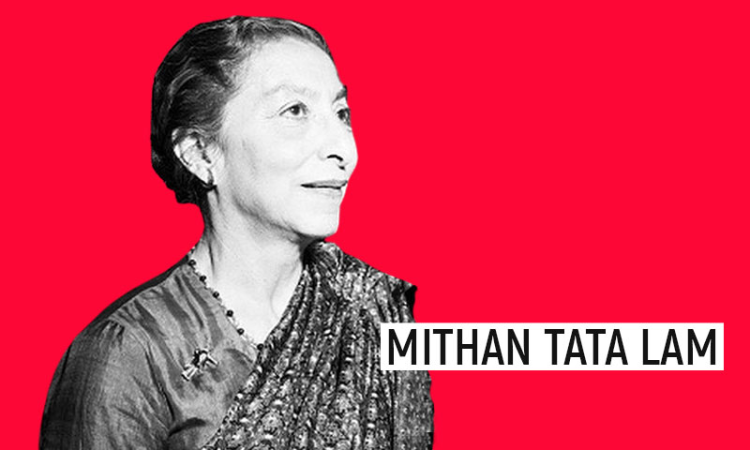Women's Day Special: Remembering-The lady of the Law- Mithan Tata Lam
Dr Charu Mathur
8 March 2021 6:05 PM IST

There are few life stories as invigorating as that of Mithan Tata. Mithan Tata has the distinction of smashing the thickest of all professional ceiling- she has the distinction of being the first women, allowed to practice law before the Bombay High Court. In a sense, she was fortunate that The Legal Practitioners (Women) Act 1923 was passed in April, 1923 which allowed woman to practice law. Bombay bar room was radiated with her presence in November 1923. She was not only the first practicing women Barrister before the Bombay High Court but also the first women from Lincoln's Inn to be called to the Bar. Incidentally, she was called on bar on 26th January, 1923. The life trajectory of Mithan Tata is unusable to say the least. She was born in 1898 to a progressive liberal father- Ardeshir Tata- a textile Mill manager based near Nagpur and Hirabai Tata, a theosophist. Mithan Tata's mother herself was a trailblazer-encouraged by her husband she studied further and was active in for social causes and Civil Rights.
In 1911, while holidaying in Kashmir, Hirabai and her daughter Mithan Tata had a chance encounter with Princess Sophia Duleep Singh. Princess Sophia Duleep Singh was a daughter of Maharaja Duleep Singh, the last Maharaja of Sikh empire. Maharaja Duleep Singh, aged 10 years was forced to sign Treaty of Lahore and had to abdicate his throne and beloved Kohinoor. He was exiled to England. There he met Princees Sophia's mother Bamba Muller- a German merchant banker.
During 1911 visit of Princess Sophia Duleep Singh to India, mother and daughter had a chance meeting with Princess Sophia and were intrigued by small yellow green badge saying:"Votes for women". Princess Sophia Duleep Singh was prominent suffragette in the UK. This, chance meeting ignited mother and daughter to demand voting rights for women in India. This demand was faced by contradictions- whether there should be full freedom from British first or the women should be right to vote. In 1918, the Montagu–Chelmsford reforms were introduced. The Lord Southborough headed the franchise committee was tasked with developing the electoral regulations under the Montagu–Chelmsford Reforms. In these reforms there was no recommendation for Indian women's enfranchisement. Large number of Petitions were filed for electoral reforms. The Lord Southborough in his 1919 report noted that educated women may be given right to vote but overall women were not ready for the vote. The report further noted that conservative sectors of society do not support women enfranchisement. This report was met by protest. So, when Lord Southborough sent his report to the Joint Select Committee (of the House of Lords and Commons) the Bombay Committee on Women's Suffrage sent Hirabai Tata and her daughter Mithan Tata to give evidence. Sarojini Naidu and Annie Besant were sent from WIA(Women's India Association). Young Mithan Tata did the groundwork and research and her mother present it further. Unfortunatley, only Naidu and Beasant were heard in person. Interestingly, Corneila Sorabjee gave confidential memorandum. She said that 10% of women are well read and are progressive while 90% are not. According to her these 90% left out women cannot be trusted and it will not be advisable to give them right to vote. Montagu-Chelmsford committee took opposition by conservative society for women's right to vote almost as same as stirring "religious feeling".
The mother and daughter stayed in London and enrolled at London School for Economics. While in England, they fought for giving women right to vote. The nationalist leaders also opposed women's right. Mithan Tata travelled to Paris and met Madam Bhikaji Cama who told her to work for India's freedom and Independence . She assured when India is free, women will not only get right to vote but other rights as well. Even Gandhiji in Young India suggested that he do not support "votes for women" at this stage. He said first goal is to get freedom from British. Undeterred, the pro franchise women continued there struggle.
In winters of 1923, Mithan Tata MA, Bsc, Barrister-at-Law joined the chambers of legendary Bhulabhai Desai at Bombay High Court. Now, she was a rare entity in the Bombay Bar. The only women in the completely male dominated bar. As understandable, there was a stiff resistance to give her work. Ironically, one of the earliest matter came to her was also because of her gender! A client had a water tight case and there was no chance of losing it. But he wanted to add "insult" of losing it to a women lawyer and so Mithan Tata- the only female Lawyer was engaged. Eventually, independent briefs started flowing to Mithan Tata.
In 1925, Lady Meherbai Tata established the National Council of Women in India and Mithan Tata led the legislative committee and which worked to improve the status of women. As a sign of first victory, Bengal Presidency in 1925 passed the bill for Women's suffrage and the Punjab approved the same in 1926. Not only this, owning to tremendous industry of Mithan Tata the British Parliament allowed the Government of India to amend the electoral rules granting women the right to become legislative members. Immediately, Madras granted the right for women to contest elections for the Provincial Legislative Council.
Mithan Tata, was not only first arguing lawyer before the Bombay High Court but became the first women professor of Law in India. She was a Professor of law in Government Law College. When India became independent 1947 she became 1st Sheriff of Bombay in independent India. Mithan Tata served on various bodies of United Nations as well as for rehabilitation of Refugees of Partition. She contributed in drafting of Parsi and Hindu personal laws.
Barrister Mithan Tata was married to Solicitor Jamshed Lam.
Views are personal
Author is a Lawyer practicing at Supreme Court of India


